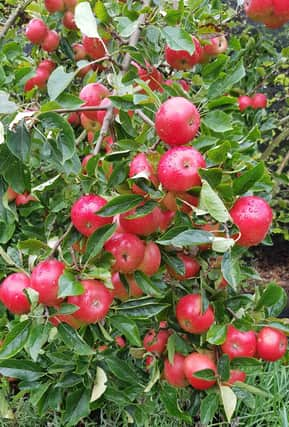GARDENING:


The `Conference` pear tree is also heavier laden than usual. And even though the `Victoria` plum is having its once-in-a-while, poor fruiting year, there are still bowls full on offer. This, following in the wake of a very satisfactory soft fruit season should offer reason to celebrate. But we are
not out of the woods yet. There are further hurdles before they`re safely stored. Blackbirds and wasps are demanding their share!
Advertisement
Hide AdAdvertisement
Hide AdApart from a few minor exceptions e.g. slugs, snails, aphids, this garden is a year-round animal friendly zone. Providing habitats that support vertebrate and invertebrate wildlife forms is part of the deal. Vital sustenance is offered to our feathered friends during the harrowing winter months and a degree of tolerance shown at the height of summer in sharing cultivated soft fruits. It's only now, as we approach the harvesting of apples, pears, and plums, that blackbirds are testing our patience.
If only they'd choose a single fruit, keep pecking and finish it off, but no, spoiled for choice, they flit from one to another damaging many, rendering them unfit for storage. Windfalls they are welcome to. We even pick a few and lay them on the lawn, but those on the trees are more attractive it seems, and netting is not always practical. Wasps have also started tunnelling into top fruits so, when picking apples and plums remember to look before you handle!
Harvesting apples before they're fully ripened is not good, and there are pointers to tell when this is. Most dessert varieties emit a particularly warm ethylene fragrance, and the blackbird presence is an obvious clue, but the failsafe test is to hold a fruit in the palm of your hand then twist and tilt the wrist upward. Ripe apples release instantly.
Our crop of culinary and dessert apples is stored in the cool, airy garage where temperatures remain above freezing point over winter. They are stacked in boxes that encourage air flow. Tradition has it that fruits are individually wrapped for protection, but given the need for regular inspection of apples, potatoes and onions stored over winter, ours remain uncovered. So,
Advertisement
Hide AdAdvertisement
Hide Adeach time I walk into the garage the fragrance of ripe apples fills the air. That is a treat in itself!
It's always sad to see a summer container with spent plants, especially when the garden centres are stocked up with suitable replacements.
This does not mean that all bedding and container displays are over, some will last until the main September/October change when we plant for spring.
Summer staying power depends upon the choice of plants and how they are maintained.
Advertisement
Hide AdAdvertisement
Hide AdIf annual subjects such as cosmos and rudbeckia were planted, there's a good chance they're still going strong, even after recent heavy rain and a fall in temperature. Ours are but sadly, the lobelia and petunia that had done so well in containers have now deteriorated, and because it's a tad early to introduce spring bedding we are bridging the gap with cyclamen and violas for cheerful effect.
It's not the first time we’ve used dwarf cyclamen at this stage of the year and they have a dual purpose. First and foremost is to fill gaps in the outdoor containers, but some are potted-on and placed indoors near a window. Given an open autumn and early winter, outdoor plantings last well into December but lose composure with the first severe frost. Those indoors will flower throughout winter with an occasional feed and watering from below. It's important not to damage the corm which sits in the surface of the compost.
Pansy and viola blooms have a permanent smile on their faces and are a cheerful addition to any autumnal display. There was a time they were unreliable as a winter flowering plant, unable to withstand the cold and wet, but breeders have gifted them with a toughness that belies their soft appearance. The frost may come and flatten them overnight but next day they spring back to their feet like a prize boxer!